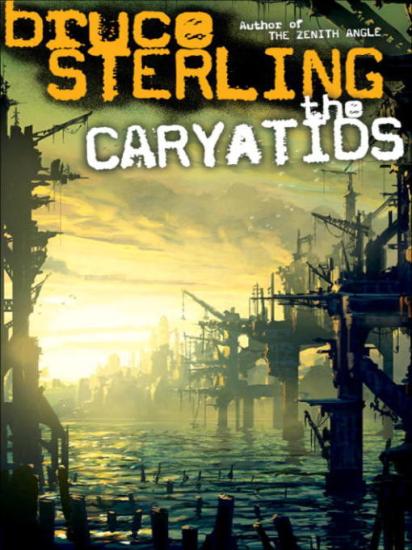
Summary:
Signature_Reviewed by_ Greg BearCaryatids, in Greek
architecture, are stone women who support massive buildings.
The Caryatids of Bruce Sterling's shimmering new
novel—Vera, Radmila and Sonja—support the weight of
a near-future world. They are the last of seven clone sisters
created by a mother accused of Balkan war crimes, now exiled in
orbit. We're 50-some years into the future, and the planet is
split into an international, symbiotic competition between the
hypernetworked Acquis, who train distressed, abandoned children
into tight-knit cadres of activists, and the Dispensation, more
sedate, mannered and cosmo-business in its orientation.Vera
works with an Acquis team remediating the Croatian island of
Mljet, laid waste by toxic dumping and the rising waters of
global warming. The Acquis technology is extreme but humanly
adapted: the users wear bonewear (amplified skeletal suits that
allow tremendous feats of speed and strength) and spex
(laser-equipped eyeshades that hook their wearers into a
postencyclopedic wonderworld of information. In a beautifully
realized and Huxleyan Los Angeles, Radmila has fit too snugly
into a Dispensation Family, but California is being squeezed
between a geological devil and the surging deep blue sea. The
Family sees these changes in terms of economic potential, and
they track real estate values by the second: Norwalk is
glamorous; beach property is cheap.Sonja, dotted with the
shrapnel of her own self-destructive past, performs medical and
social work in the middle of a constantly rebirthing China. Due
to female infanticide, there are far more men than women in
China—the reverse of Russia, where men die
young—and Sonja hooks up with a Gobi jihadist who
indulges both her sexual appetites and her political ambitions.
Sterling's language is kaleidoscopic. We swim into a chapter,
and his ideas and language flash and dance like sunlight off
the Adriatic, then coalesce in a moment of plot; the effect is
unsettling, but suited to the world he reveals spark by
hammered spark. Dispersed around the world, the sisters mirror
Earth's difficulties: traumatized by their origin, they hate
each other. Their solutions may be Earth's solutions as well.
In John Brunner's 1968 masterpiece,
Stand on Zanzibar, excerpts from fictional author Chad
C. Mulligan's The Hipcrime Vocab provide sharp, street-smart
and world-wise commentary on the culture of 2010. Bruce
Sterling is the closest we've come to Mulligan in the actual
21st century. His international perspective is rare in science
fiction, which often suffers from Amerocentric bias. A new
novel from Sterling is a guarantee of something wild and tasty,
and
The Caryatids amply fulfills that promise._
(Mar.)__Greg Bear's latest science fiction novel,_ City at the
End of Time_, was published by Del Rey in August._
Books of Big Ideas often polarize reviewers, and Bruce
Sterling's latest novel is no exception. Either the best SF
book of this or any other year (Cory Doctorow) or "a mess of a
book about the mess of the world" (John Clute),
The Caryatids, at the very least, illustrates
Sterling's ability to raise voices (in praise or protest) 30
years after he laid the groundwork for the cyberpunk movement,
without which contemporary SF would be a much rockier -- and
much less diverse -- landscape. Sterling's complex,
controversial vision of our future invites comparison to Neal
Stephenson (_Cryptonomicon_,
Snow Crash) and William Gibson (_Neuromancer_). Love
him or hate him, Bruce Sterling always has something important
to say, and
The Caryatids is worth a look.Copyright 2009 Bookmarks
Publishing LLCFrom Publishers Weekly
Copyright © Reed Business Information, a division of Reed
Elsevier Inc. All rights reserved.From Bookmarks Magazine